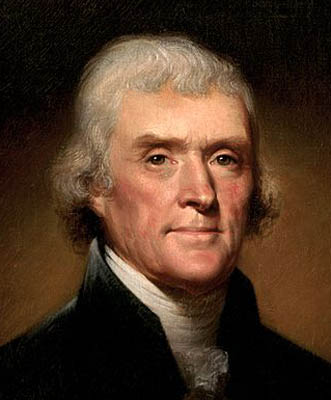Presidents and Horses:
Thomas Jefferson and Caractus

|

|
Thomas Jefferson (April 13, 1743 (April 2, 1743 old calendar) – July 4, 1826) was the Third President of the United States. Having some roots in the soil of Virginia, I was bought up to admire Jefferson. He was the author of the Declaration of Independent, prime mover of the Louisiana Purchase, founder of the University of Virginia, advocate of universal education, inventor, architect, naturist and rare intellect. However, in more recent times I have learned of the other Jefferson. This is the man who kept slaves despite his high ideals, who applauded the French Revolution even when it became clear that it was a blood bath and one who was among the earliest practitioners of what we now would call political dirty tricks. It is hard to reconcile these two Jeffersons, but such is the nature of men. We all contain contradictions and Jefferson’s are more noticeable that yours or mine because of his historical prominence.
However, Jefferson was really very much like Doctor Jekyll and Mr. Hyde when it came to Jefferson, the horseman. Although he was among the best read men of his age, one book he might have profited by reading and could not was Black Beauty. This is understandable since it was published after his death. Jefferson was a man who wrote bold words but did not participate in public debates. He was always, polite, soft spoken and not given to confrontation. However, on horseback a change came over Jefferson and he would fly into a rage and become abusive towards his horse when he detected even the slightest disobedience on the part of the animal. His acquaintances were quite taken back when witnessing his rages as they seemed totally out of character.
Jefferson kept very detailed records of his household and business management. He was a wealthy man but at the same time spent freely and was often in serious debt. This was not at all uncommon among the Virginia planters. When it came to horses he acquired only the best and he owned over is life time a large number of them and was engaged in breeding. His best known horse was Caractus, who was named after a British Celtic Chieftain. Caractus was fold in 1775. His grandsire was Old Fearnaught, a Thoroughbred that raced in England and was imported to colonies. He was used for breeding but also as a saddle horse by Jefferson. During 1781 while Jefferson was governor of Virginia on two occasions British forces came close to capturing Jefferson but he managed to elude them. According to the 1844 recollections of Jefferson’s slave, Isaac Jefferson, on at least one of these occasions Jefferson escaped on Caractus’ back. Catactus is also known to have thrown Jefferson at Popular Grove, one of his plantations, and Jefferson suffered a fractured arm as a result.
I still believe that Jefferson, taken in his totality, was a great man. We should not judge historical figures by modern standards but rather by the standards of the times in which they lived. Jefferson likely would have been rather taken back and puzzled by our modern notion of animal rights. Like many in his time he would have considered them beasts that existed solely for the benefit of their master. His horses were well cared for but he would have felt no more empathy towards them than he would have his slaves or other chattel.
Yours truly,